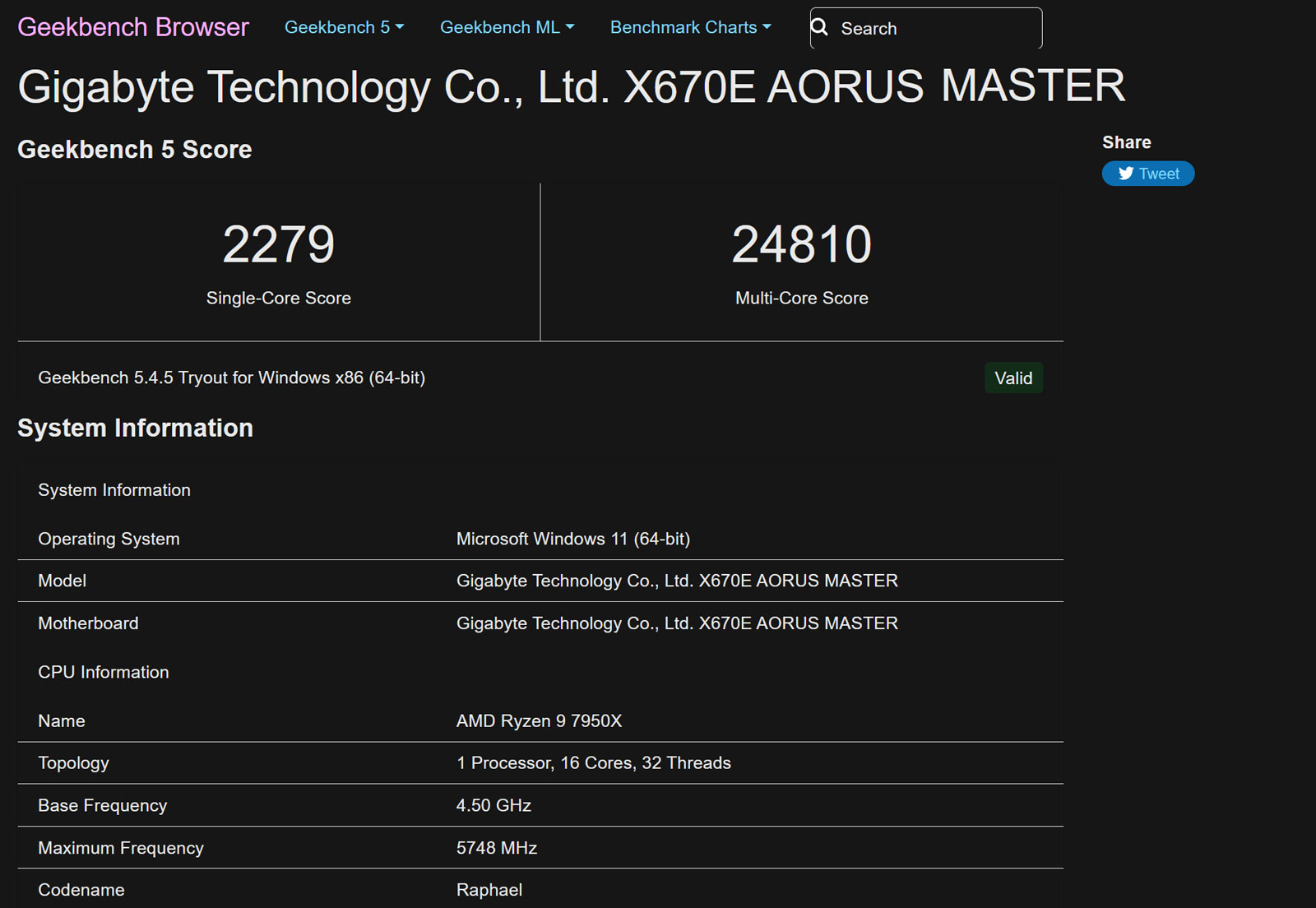AMD Ryzen 9 7950X Progress Touted With Latest BIOS
The Ryzen was apparently tested on a new Aorus Master X670E motherboard.
New benchmarks, which appear to have been undertaken on a PC powered by an AMD Ryzen 9 7950X, have appeared on the Geekbench online database today. Twitter’s usually reliable Tum Apisak unearthed these scores which, as usual for Geekbench 5, provide both a single- and multi-core performance score to ponder over and compare with the wide range of officially launched processors on its database. Moreover, we can look at how the score measures up to previous leaks and spills.
Apisak says this PC system featured a new BIOS, which should provide a leg-up in the benchmarks perhaps – we shall see.
The Ryzen 9 7950X's single-core (1T) score lands at 2279 and its multi-core (nT) score is 24810. Reported as a 16C/32T chip, as per the information shared by AMD in late August, the 7950X is easily 10% faster in 1T tests and trails only one processor in the Geekbench hall of fame in nT tests — the Ryzen Threadripper 3990X with 64 cores.
To help paint a clearer picture of where this AMD Ryzen 9 7950X stands in the current hierarchy, we have made a table comparing several official processor scores from the likes of the 5950X and 12900KS. Additionally, we have looked back on some older leaks of the 7950X in Geekbench, to see if there is any barnstorming benefits to the alleged “new BIOS” updated motherboard.
The table above certainly indicates the next generation Ryzen 7000 ‘Raphael’ processors from AMD will deliver a substantial intergenerational performance uplift. These are leaks, so we must add salt, but there is a pretty consistent performance pattern in these Geekbench tests. Moreover, with all the technological advantages officially trumpeted by AMD, the advances aren’t wholly surprising. Officially AMD has been boasting that, compared to the Ryzen 5000 models, the new series is 29% faster at gaming and offers 44% better performance in productivity.
Considering whether the ‘new BIOS’ breaks new ground, there isn’t any evidence that it does. Apisak’s new result from a Gigabyte Aorus motherboard foundation, is only 2-3% faster in 1T tests, easily within the margin of error for system performance testing with all the variables involved. We also shouldn’t look past leaks like these being a ‘sample size of one.' Having said that, these are very good.
|
CPU |
Price |
Cores / Threads (P+E) |
Base / Boost Clock (GHz) |
Cache (L2+L3) |
TDP / Max |
Memory |
|---|---|---|---|---|---|---|
|
Ryzen 9 7950X |
$699 |
16 / 32 |
4.5 / 5.7 |
80MB |
170W / 230W |
DDR5-5200 |
|
Ryzen 9 7900X |
$549 |
12 / 24 |
4.7 / 5.6 |
76MB |
170W / 230W |
DDR5-5200 |
|
Ryzen 7 7700X |
$399 |
8 / 16 |
4.5 / 5.4 |
40MB |
105W / ? |
DDR5-5200 |
|
Ryzen 5 7600X |
$299 |
6 / 12 |
4.7 / 5.3 |
38MB |
105W / ? |
DDR5-5200 |
AMD’s Ryzen 9 7950X is scheduled to become available next Tuesday, as the new Ryzen flagship alongside three other Raphael chips. If you want some further reading between now and the release date (Sept 27) please check out our frequently updated all we know article about AMD's Zen 4 processors for desktops.
Get Tom's Hardware's best news and in-depth reviews, straight to your inbox.

Mark Tyson is a news editor at Tom's Hardware. He enjoys covering the full breadth of PC tech; from business and semiconductor design to products approaching the edge of reason.
